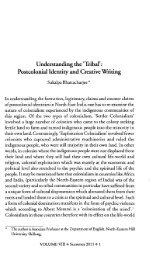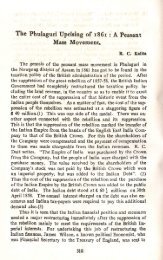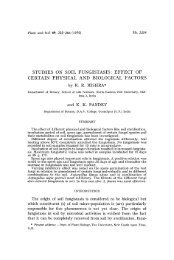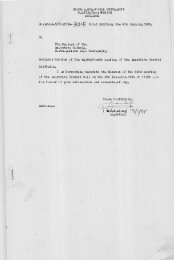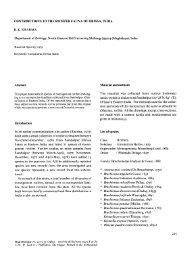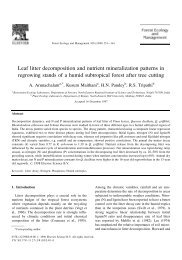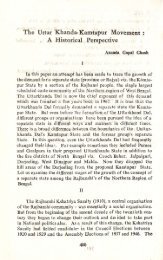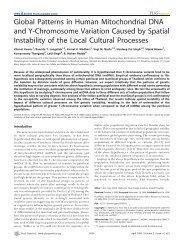Ethics and Envirnmnt.pdf - DSpace@NEHU - North-Eastern Hill ...
Ethics and Envirnmnt.pdf - DSpace@NEHU - North-Eastern Hill ...
Ethics and Envirnmnt.pdf - DSpace@NEHU - North-Eastern Hill ...
Create successful ePaper yourself
Turn your PDF publications into a flip-book with our unique Google optimized e-Paper software.
INTRODUCTION<br />
My main concern in this work has been to try <strong>and</strong> answer the<br />
question, "How is environmental ethics possible?" The original<br />
intention ~ if that is the right word - was to write an essay<br />
recognizably within the domain of a conventional philosophical work<br />
complete with analysis, argumentation <strong>and</strong> conclusions. But what I<br />
have actually produced is nothing of the kind. While my basic concern<br />
does remain philosophical, the work is not a sustained analytic<br />
argument or series of arguments for a particular thesis; nor does it<br />
consist in the detailed working out of a position from a critique of a<br />
variety of philosophical theses <strong>and</strong> arguments. Analysis,<br />
argumentation <strong>and</strong> critical evaluation of philosophical positions are<br />
certainly there; but they serve a secondary rather than a primary<br />
purpose. My jusitification for this is that so-called "rigorous"<br />
philosophising is frequently a trap which shuts out all true illumination<br />
<strong>and</strong> creates only an illusion of light. What I have done here is to put<br />
together a series of thoughts related to each other in many different<br />
ways - but all of them woven around the theme of the possibility of a<br />
genuinely evaluative concern for nature.<br />
Part I of the work deals with what I call the modern divide:<br />
this is the divide between mind <strong>and</strong> matter, man <strong>and</strong> nature, fact <strong>and</strong><br />
value, science <strong>and</strong> faith <strong>and</strong> so on. Of course, there are intimations of<br />
such a divide in pre-modern times as well; but in modernity this<br />
divide takes on a character of ultimacy which affects all our ways of<br />
organizing our experiences of ourselves <strong>and</strong> of the world <strong>and</strong> of<br />
underst<strong>and</strong>ing our predicament. Given this divide, ethics or morals<br />
can only be understood as belonging firmly to the domain of man.<br />
<strong>Ethics</strong> regulates man's relationship with others of his own species.<br />
This must be so - so it would appear - irrespective of whether one<br />
believes that the nature of ethical obligation is grounded in our<br />
subjectivity, or that it is grounded in the objectivity of values or in<br />
our rational nature or what have you. If morals have thus only to do<br />
with my relationship with other human beings, what kind of evaluative




